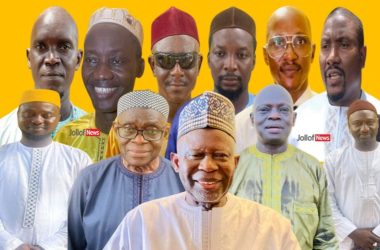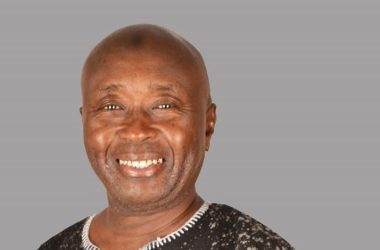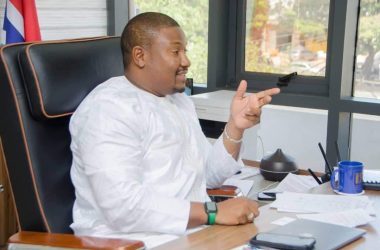
Following the shooting of Ousman Sillah, lead counsel for the defence team, Edward Gomez, who was the most senior lawyer in the remaining team, took over the mantle of leadership. Gomez, who never hid his support for President Jammeh and the APRC, was initially representing YDE and Baba Jobe’s co-accuse, Baba Kanteh.
Unlike Ousman Sillah, Edward Gomez, who perhaps was looking for the position of Attorney General and Justice Secretary, took a lame approach to the case. Ignoring the very basics of the case, Lawyer Gomez tried to establish a relationship between the state, Baba Jobe and YDE. And in order to convince the court of the close relationship between the three, he tendered some invoices pertaining to the payment of salaries of staff and maintenance of the presidential jet, New Millennium Airline, the pre-financing of the 2002 groundnut trade season, HAJJ packages to hundreds of Gambians, the presidential Meet the People’s tours, excursion trips of the National Patriotic Student Association (Napsa), sponsoring APRC meetings and rallies across the country among others.
Although the said documents were accepted and marked as exhibits by Justice Paul, he did made it clear to the defence team that they were not relevant and cannot help the case. However, Lawyer Gomez continued to piled one document after the other to the court, which revealed huge financial payments made by YDE to the state on the orders of President Jammeh. He only tried to make a strong defence during his final address to the court when he said the decree on which Baba Jobe, Baba Kanteh and YDE were charged was particularly promulgated by the AFPRC junta to tackle the issue of under invoicing and other corrupt vices, which was prevalent during the transition and not tax evasion.
Baba Jobe was also given wrong guidance throughout the case. He was blinded by the large legal team he had and was perhaps too scared to say anything that would implicate President Jammeh. Never did he attempted to expose President Jammeh or link his connections with YDE. He sometimes gave wrong answers to questions asked by his lawyers or the DPP and in certain instances said more than he was supposed to say.
Baba Jobe’s lawyers also failed to fight for them to be allowed unlimited access to him at the Police Training School where he was detained since his arrest at Sibanor. They only met him for one hour or 30 minutes at high court before the commencement of court proceedings, which gave them little opportunity to hold briefings as well as give proper guidance to their client.
A senior lawyer of his defence team even failed to show up in court to make a closing argument on why he believed Baba Jobe was innocent. Some lawyers of the defence team even did not bother going to court at the latter end of the case as they were too busy attending other cases.
All taken away
Since his arrest with his colleagues on December 27, Baba Jobe was put under 24-hour security. He was denied access to even his wife by the police, who were acting on strict orders from the top. He was escorted every Monday Tuesday and Wednesday to Banjul to face his economic crime case.
For fear of an uprising among disgruntled July Youth Movement members, armed officers of the police intervention unit were always deployed at the high court premises with the orders to shot and kill any rioter. Armed State Guard officers were also deployed at the Denton Bridge and other strategic places within the Greater Banjul Area. The officers searched every vehicle heading to the capital, thus causing heavy traffic jams on the Serrekunda-Banjul Highway.
With the case nearing an end, some wealthy Libyans close to Muammar Gadaffi were said to have visited the country in a bid to settle the matter out of court. Their request for audience with President Jammeh was flatly rejected and both GPA and Customs and Excise were reported to have also refused to meet the delegation. After days of fruitless attempts, the Libyans flew out of Banjul with disappointment.
To make matters worse, an application seeking the unconditional release of Baba Jobe filed by Lawyer Edward Gomez was denied by Justice Paul. And two days before a judgement was made on his economic crime case, Baba Jobe was taken to Mile Two Central Prisons, where he issued a statement through Lawyer, Mai Fatty expressing his frustration and lack of confidence in the whole judicial process.
And on March 30 2006, Baba Jobe was convicted on five counts of economic crimes and jailed for eight years in prison. He was also ordered to pay millions of Dalasis to Customs and Excise and GPA in default of which he was to serve an additional three more years in prison and his assets frozen. His co accused Baba Kanteh was acquitted and discharged on all counts.
Soon after the verdict was read, Baba Jobe turned around shook the hand of Baba Kanteh, who was still in shock and
bade him goodbye.
In order to further humiliate Baba Jobe before the whole world, the state television, GRTS, which never covered the court proceedings, was sent to the high court to screen his final fall. While newspaper reporters were ordered out of the crowded court premises, GRTS was allowed to freely film the drama including when Baba Jobe was boarding a waiting prison pick-up.
To hinder any prospect of appeal, Justice Paul for many months failed to serve copies of his judgement to Baba Jobe’s lawyers. He gave a silly excuse that the 40 page document was hand written and was being typed by his secretary. A senior judicial officer informed Mai Fatty that there were orders from State House to suppress Baba Jobe’s case.
Shortly after the conviction of Baba Jobe, the Gambia government which had for many years disputed UN Resolution 1343 that accused Mr. Jobe of armed trafficking complied with the UN order for his assets to be frozen. His family was evicted from his residence in Kotu. Ironically, two years earlier, the Gambian representative at the UN had lobbied for sanctions to be lifted on Mr. Jobe.
Baba Jobe was abandoned by all his friends including those closed to him. Some YDE members including Kuru Kongira, Hamidou Baldeh, Buba Senghore and Modou Sula even visited President Jammeh in Kanilai to apologise to him. To show their support for the APRC, they embarked on a country wide tour during which they made all sort of sick remarks against Mr. Jobe.
Meanwhile, while Baba Jobe’s defence team was waiting for copies of the judgement to decide their next move, the state acted differently. Instead of waiting for Baba Jobe to pay Customs and GPA, President Jammeh, who owned YDE, ordered the closure of the company. The NIA was made in charged of collecting YDE’s debts instead of Babe Jobe’s lawyers. NIA officers secretly arrested and detained many YDE debtors at the agency’s headquarters in Banjul. Many debtors were alleged to have been tortured and threaten into settling the debt.
Interestingly, despite the non-compliance of Baba Jobe to settle GPA and Customs, the state did not bother pursuing the matter in court.
Admission
Following the conviction of Baba Jobe, President Jammeh used his annual Dialogue with the People’s Tour to mock his former right hand man whom he accused of betrayal. Jammeh admitted locking Baba Jobe in the Five Star Hotel [Mile Two Prisons] for his mismanagement of YDE’s fund.
Also commenting on the issue in Pakaliba in June 2004, the former secretary of state for Trade, Edward Singhateh, was quoted by the State House Website saying: “The issue of Baba Jobe does not concern anyone, because the two [Baba Jobe and President Jammeh] know each other when President Jammeh was head of the Military Police under Jawara’s administration.
“The Gambian leader has high regards for Baba Jobe the reason of which he was given the Youth Development Enterprise to manage and help government to stabilise commodity prices, but things went otherwise. What we saw on local newspapers are just small in terms of YDE resources mishandled by Baba Jobe. The depreciation of the Dalasi was caused by Baba Jobe, who was colliding with some senior officers at the Central Bank in the foreign exchange transaction. Baba Jobe has betrayed the whole country and if he had taken my advice earlier, this would not have happened to him.”
Baba Jobe himself at one point admitted in court that the reason why he was in court was not about tax evasion. “I know the reason why I am brought to court. The issue is not about the non-payment of ports and custom charges, because we have more money in our account than what we are said to have owed the two institutions. It is between me and the higher authorities and I will not say who and why.”
These admissions show that Baba Jobe was completely innocent of the charges he was convicted of. He should have been charged for mismanagement of YDE funds and nothing else. His arrest and conviction shows the extend of which the Gambian judiciary was controlled by President Jammeh, who used his mercenary judges like Madabuchi Abuchi Paul, Okoi Itam, Akomaye Agim among others to punish anyone who fell out with him.
Meanwhile, while fighting with the Justice Department and the Chief Justice of the Gambia to get Baba Jobe’s appeal case heard, on 23rd July 2007 while driving home from work, Mai Fatty was involved in road traffic collision around the Tourism Development Area which left with serious injuries including multiple cervical fractures, multiple femoral fractures and multiple fractures.
Mr Fatty believes that the incident was orchestrated by the Jammeh regime to send him to an early grave. Describing the incident in detail, Mr Fatty said: “Half a mile near my home, about three minutes from President Yaya Jammeh’s Officers Mess (the exclusive entertainment centre for the top military brass at Kotu), I saw a trailer truck coming in the opposite direction. But as it neared me, the truck left its lane and rammed into me twisting the front of my grey 745 BMW car 180 degrees towards the direction I was driving away from. I was covered in a pool of my own blood and was pronounced dead at the scene. It took the Gambia Fire and Ambulance Services over two hours to get me out of the car. My car was surrounded by plain clothed and uniformed agents from other law enforcements outfits. The officers tried to hand cuff my younger brother who was called to the scene by a spectator who identified me in the wreckage, for arguing with them about how and where they should hold me and for ‘obstructing’ their mission. I was taken to the Royal Victoria Teaching Hospital, Banjul. I later received information attributed to law enforcement sources that the accident was orchestrated, and I was to die in the crash. Another medical source revealed that I was to be ‘finished’ in hospital, but the security guy posted to keep night watch over me decided to sleep believing that in that broken shape I wasn’t a flight risk. Fortunately for me, my evacuation out of the country was managed efficiently and swiftly, and I was quietly taken out of the private ward late in the night to the airport to wait for the aircraft that flew me to Dakar, Senegal at dawn.”
Meanwhile, despite sending his old friend to prison and taking everything away from him, President Yahya Jammeh ordered his hit men to kill Baba Jobe, who was nearing the end of his jail term. On October 28th 2011 while receiving treatment at the Royal Victoria Teaching Hospital, members of Mr Jammeh’s hit squad, The Jungulars, rocked up at the hospital and suffocated him to death with a pillow. The Gambia government attributed his death to high blood pressure and refused to carryout post-mortem on him. His remains were laid to rest in his native Jarra Karantaba.




